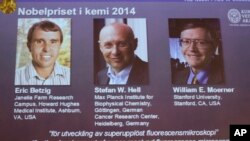Three scientists - Americans Eric Betzig and William Moerner and German Stefan Hell - received the 2014 Nobel Prize for chemistry for the development of microscopes so powerful they can be used to see how diseases develop inside the tiniest living cells, the Royal Swedish Academy of Sciences said on Wednesday.
"Their ground-breaking work has brought optical microscopy into the nanodimension," the academy said in a statement awarding the 8 million crown ($1.1 million) prize.
Optical microscopy is the pathway used by scientists to view cells on a molecular level, allowing them see how molecules create synapses between nerve cells in the brain, as well as track proteins involved in Parkinson's, Alzheimer's and other serious diseases.
The work done by Betzig, Moerner and Hell allows scientists to study these processes at a level smaller than previously thought possible.
Significant advance
Swedish physical chemist Anders Hagfeldt said the three laureates' work is a significant advance.
"If you want to see living things, you have to use something that does not destroy the sample and by normal light and that was said that it cannot be done basically, so now with these three laureates here it has been possible," Hagfeldt said.
"Now we can see inside living cells. We can see how molecules interact and we can start to learn how life is basically. So it's a completely new breakthrough in seeing chemistry, let's say," he added.
Chemistry was the third of this year's Nobel prizes.
Earlier this week, American-British scientist John O'Keefe and Norwegians May-Britt Moser and Edvard Moser won the Nobel Prize in medicine on Monday for their work in discovering the brain's inner navigation system.
And on Tuesday, Japanese scientists Isamu Akasaki and Hiroshi Amano and American scientist Shuji Nakamura were honored for their work in the 1990s in creating bright, energy-efficient white light from semiconductors, succeeding where scores of other scientists had failed.
The prize for literature will be awarded on Thursday, and the Nobel Peace Prize will be awarded on Friday.
The prize is named after dynamite inventor Alfred Nobel and has been awarded since 1901 for achievements in science, literature and peace in accordance with his will.
Some material for this report came from Reuters.





